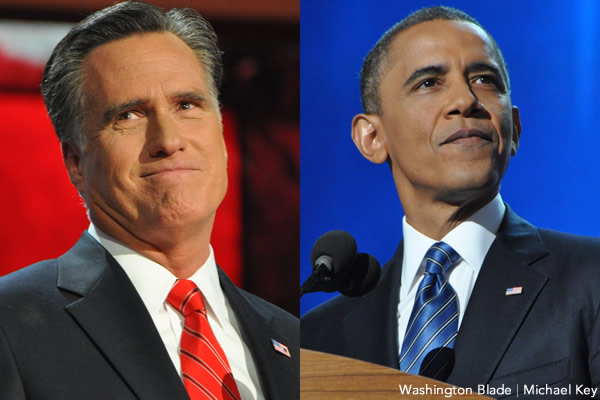National
Will Obama, Romney talk marriage in upcoming debate?
Issue not as prominent in campaign as 2004, 2008


President Obama and Mitt Romney are set to square off on domestic issues at next week’s debate in Denver. (Blade photos by Michael Key)
Next week’s presidential debate could mark the first opportunity for President Obama and Republican presidential nominee Mitt Romney to face off on marriage in a race in which LGBT issues have figured less prominently than previous elections.
The debate — the first in a series of three for the presidential candidates — is set to take place on Wednesday at the University of Denver. The topic for the 90-minute debate is domestic policy, and LGBT issues and marriage equality would fall under that umbrella.
The moderator of the debate is Jim Lehrer, the executive editor and former news anchor for PBS NewsHour. It’s unclear if he’ll ask a question on LGBT rights or marriage at the debate. But a question on LGBT rights could create an opportunity for Obama, who endorsed same-sex marriage in May, to attack Romney for not only opposing marriage rights for gay couples, but supporting a U.S. constitutional amendment banning same-sex marriage.
Evan Wolfson, president of Freedom to Marry, said if a marriage question was posed to the candidates during the debate, he’d like to hear Obama “repeat the same heartfelt personal explanation” that he offered in May when he announced he completed his evolution in support of marriage equality.
“And I’d like him to point out that just as it was wrong to deny couples of different races — like his parents — the freedom to marry, so under our Constitution, it is wrong to exclude couples of the same sex from the commitment of marriage and the freedom to marry under the law,” Wolfson said.
Even though marriage will be on the ballot in four states and lawsuits are pending before the Supreme Court that would overturn the Defense of Marriage Act and California’s Proposition 8, both candidates have remained largely silent on marriage and other social issues and have focused more on the economy and national security.
Crosby Burns, a research associate on LGBT issues at the Center for American Progress, said the two candidates’ differing views on marriage could “not be more stark.”
“You have Mitt Romney who supports a Federal Marriage Amendment that would define marriage as the union between one man and one woman,” Burns said. “And Barack Obama, on the other hand, as you know has come out in May in favor of full marriage equality. If he’s asked a question at next week’s debate in Denver, I fully expect him to reiterate his unyielding support for marriage equality.”
But Dan Pinello, who’s gay and a political scientist at City University of New York, predicted that if the candidates are asked a marriage question during the debate, they would give “very abbreviated answers” because neither Obama nor Romney sees political gain by elevating the issue of marriage.
“If Jim Lehrer does say something about it, I think Mitt Romney will say this is an issue the states have to decide — nothing a president will have any authority over, but a state issue,” Pinello said. “I think Barack Obama, if he’s forced to address it, will say what he’s said before: it’s a personal issue … whatever he said a few months ago. But they’ll try to step around the issue as much as they can.”
Circumstances were much different in the recent past. Just two presidential elections ago, when Sen. John Kerry (D-Mass.) was running against then-President George W. Bush for the White House, the issue of marriage was a cornerstone of the Republican campaign at a time when 13 marriage amendments were on the ballot in states throughout the country.
In his 2004 State of the Union address, Bush said the country “must defend the sanctity of marriage” by passing a Federal Marriage Amendment to prevent “activist judges” from instituting same-sex marriage in their states. Asked about the issue on the campaign trail, Kerry would uncomfortably say he believes marriage is one man, one woman, but doesn’t think the U.S. Constitution should be involved.
Four years later, the issue of same-sex marriage figured less prominently in the contest between then-Democratic candidate Obama and Republican nominee John McCain. It came up during a forum hosted by Pastor Rick Warren of California’s Saddleback Church, when McCain said he thinks marriage should be left to the states, but would support a constitutional amendment banning same-sex marriage if his home state of Arizona were forced to recognize it. Obama also said he believed marriage is between one man, one woman because “God’s in the mix” — a position he has since changed — as he declined to support a Federal Marriage Amendment.
Warren isn’t even hosting the forum during this presidential election. In August, Warren announced he was pulling the plug on a similar event with Obama and Romney because of what Warren perceived as the uncivil discourse of both campaigns.
Pinello attributed the change in prominence of the issue of same-sex marriage to change in public opinion, saying eight years ago people were “very much” against marriage equality, but today a bare majority of the American public supports it.
“The Democrats don’t want to energize the social conservatives to go to the polls, and Romney doesn’t want to turn off moderates by appearing too harsh on social issues,” Pinello said.
Polls show a distinct change in position on same-sex marriage over the course of the last few election cycles. A report published in April by the Pew Research Center indicates a growing evolution in public opinion. In 2004, 60 percent of the American public opposed same-sex marriage while 31 percent supported it. Those figures changed in 2008 from 51 percent opposing it and 39 percent supporting it. This year, the report found the numbers had switched: 47 percent of people back marriage equality, while 43 percent oppose it.
In the past week, discussion of LGBT issues on the Republican side has come not from Romney, but his No. 2 on the ticket: Republican vice presidential candidate Paul Ryan. In an interview over the weekend with ABC affiliate WPTV in Florida, Ryan said when asked if he believes the military should return to the policy of “Don’t Ask, Don’t Tell” that the law shouldn’t be reinstated and “this issue is past us.”
“I talked to a lot of good friends of mine who are combat leaders in the theater, and they just didn’t think the timing of this was right to do this when our troops were in the middle of harm’s way in combat,” said Ryan. “Now that it’s done, we should not reverse it. I think that would be a step in the wrong direction because people have already disclosed themselves.”
On Tuesday, Ryan reiterated his opposition to marriage equality, saying “traditional marriage” is among the shared “universal human values,” even though same-sex marriage is legal in six states and D.C. and recognized in 11 countries. Ryan praised Romney at the Values Voter Summit earlier this month, as a “defender of marriage.”
The exception to the general lack of discussing LGBT issues came at the national conventions. At the Democratic National Convention, speakers weren’t shy about talking about their support for marriage equality. A video was played highlighting Obama’s support for it, and during his nomination acceptance speech Obama criticized “Washington politicians who want to decide who you can marry.”
Marriage references were more limited at the Republican convention, but the subject did come up, notably by former Arkansas Gov. Mike Huckabee, who criticized Obama for his support for “changing the definition of marriage” while still identifying as an evangelical Christian. In his nomination acceptance speech, Romney pledged to “honor the institution of marriage.”
Burns said the emphasis on the issue of marriage at the Democratic convention shows the party has grown to embrace it after being uncomfortable with the issue in years past.
“Every single speech that I heard almost in some way, shape or form — especially among the headliners — brought up gay and lesbian couples,” Burns said. “If you have the party leaders at the DNC convention touting their support for LGBT people, I think that’s indicative of the black and white differences between early elections and now where we have a party fully embracing LGBT equality rather than a lukewarm acceptance that you saw beforehand.”
One game changer for the election in terms of marriage could be the results of what happens with pending litigation before the Supreme Court challenging Prop 8. In the weeks remaining before Election Day, justices could decline to hear the case, allowing same-sex marriage to return to California immediately as soon as a mandate is issued from the U.S. Ninth Circuit Court of Appeals. Romney, who has supported Prop 8, may decide to incorporate that outcome as part of his campaign.
But Pinello predicted the level of attention to marriage would remain the same even if same-sex marriage were to resume in California because gay couples are already marrying in other places within the United States.
“There’s nothing new about that,” Pinello said. “It’s happening in six or seven other jurisdictions presently. It already did happen in California with 18,000 couples in 2008. So, there’s really nothing new about that and I don’t see that having much of an impact other than very short-term coverage.”
U.S. Supreme Court
Supreme Court to consider bans on trans athletes in school sports
27 states have passed laws limiting participation in athletics programs

The U.S. Supreme Court on Thursday agreed to hear two cases involving transgender youth challenging bans prohibiting them from participating in school sports.
In Little v. Hecox, plaintiffs represented by the ACLU, Legal Voice, and the law firm Cooley are challenging Idaho’s 2020 ban, which requires sex testing to adjudicate questions of an athlete’s eligibility.
The 9th U.S. Circuit Court of Appeals described the process in a 2023 decision halting the policy’s enforcement pending an outcome in the litigation. The “sex dispute verification process, whereby any individual can ‘dispute’ the sex of any female student athlete in the state of Idaho,” the court wrote, would “require her to undergo intrusive medical procedures to verify her sex, including gynecological exams.”
In West Virginia v. B.P.J., Lambda Legal, the ACLU, the ACLU of West Virginia, and Cooley are representing a trans middle school student challenging the Mountain State’s 2021 ban on trans athletes.
The plaintiff was participating in cross country when the law was passed, taking puberty blockers that would have significantly reduced the chances that she could have a physiological advantage over cisgender peers.
“Like any other educational program, school athletic programs should be accessible for everyone regardless of their sex or transgender status,” said Joshua Block, senior counsel for the ACLU’s LGBTQ and HIV Project. “Trans kids play sports for the same reasons their peers do — to learn perseverance, dedication, teamwork, and to simply have fun with their friends,” Block said.
He added, “Categorically excluding kids from school sports just because they are transgender will only make our schools less safe and more hurtful places for all youth. We believe the lower courts were right to block these discriminatory laws, and we will continue to defend the freedom of all kids to play.”
“Our client just wants to play sports with her friends and peers,” said Lambda Legal Senior Counsel Tara Borelli. “Everyone understands the value of participating in team athletics, for fitness, leadership, socialization, and myriad other benefits.”
Borelli continued, “The U.S. Court of Appeals for the Fourth Circuit last April issued a thoughtful and thorough ruling allowing B.P.J. to continue participating in track events. That well-reasoned decision should stand the test of time, and we stand ready to defend it.”
Shortly after taking control of both legislative chambers, Republican members of Congress tried — unsuccessfully — to pass a national ban like those now enforced in 27 states since 2020.
Federal Government
UPenn erases Lia Thomas’s records as part of settlement with White House
University agreed to ban trans women from women’s sports teams

In a settlement with the Trump-Vance administration announced on Tuesday, the University of Pennsylvania will ban transgender athletes from competing and erase swimming records set by transgender former student Lia Thomas.
The U.S. Department of Education’s Office for Civil Rights found the university in violation of Title IX, the federal rights law barring sex based discrimination in educational institutions, by “permitting males to compete in women’s intercollegiate athletics and to occupy women-only intimate facilities.”
The statement issued by University of Pennsylvania President J. Larry Jameson highlighted how the law’s interpretation was changed substantially under President Donald Trump’s second term.
“The Department of Education OCR investigated the participation of one transgender athlete on the women’s swimming team three years ago, during the 2021-2022 swim season,” he wrote. “At that time, Penn was in compliance with NCAA eligibility rules and Title IX as then interpreted.”
Jameson continued, “Penn has always followed — and continues to follow — Title IX and the applicable policy of the NCAA regarding transgender athletes. NCAA eligibility rules changed in February 2025 with Executive Orders 14168 and 14201 and Penn will continue to adhere to these new rules.”
Writing that “we acknowledge that some student-athletes were disadvantaged by these rules” in place while Thomas was allowed to compete, the university president added, “We recognize this and will apologize to those who experienced a competitive disadvantage or experienced anxiety because of the policies in effect at the time.”
“Today’s resolution agreement with UPenn is yet another example of the Trump effect in action,” Education Secretary Linda McMahon said in a statement. “Thanks to the leadership of President Trump, UPenn has agreed both to apologize for its past Title IX violations and to ensure that women’s sports are protected at the university for future generations of female athletes.”
Under former President Joe Biden, the department’s Office of Civil Rights sought to protect against anti-LGBTQ discrimination in education, bringing investigations and enforcement actions in cases where school officials might, for example, require trans students to use restrooms and facilities consistent with their birth sex or fail to respond to peer harassment over their gender identity.
Much of the legal reasoning behind the Biden-Harris administration’s positions extended from the 2020 U.S. Supreme Court case Bostock v. Clayton County, which found that sex-based discrimination includes that which is based on sexual orientation or gender identity under Title VII rules covering employment practices.
The Trump-Vance administration last week put the state of California on notice that its trans athlete policies were, or once were, in violation of Title IX, which comes amid the ongoing battle with Maine over the same issue.
New York
Two teens shot steps from Stonewall Inn after NYC Pride parade
One of the victims remains in critical condition

On Sunday night, following the annual NYC Pride March, two girls were shot in Sheridan Square, feet away from the historic Stonewall Inn.
According to an NYPD report, the two girls, aged 16 and 17, were shot around 10:15 p.m. as Pride festivities began to wind down. The 16-year-old was struck in the head and, according to police sources, is said to be in critical condition, while the 17-year-old was said to be in stable condition.
The Washington Blade confirmed with the NYPD the details from the police reports and learned no arrests had been made as of noon Monday.
The shooting took place in the Greenwich Village neighborhood of Manhattan, mere feet away from the most famous gay bar in the city — if not the world — the Stonewall Inn. Earlier that day, hundreds of thousands of people marched down Christopher Street to celebrate 55 years of LGBTQ people standing up for their rights.
In June 1969, after police raided the Stonewall Inn, members of the LGBTQ community pushed back, sparking what became known as the Stonewall riots. Over the course of two days, LGBTQ New Yorkers protested the discriminatory policing of queer spaces across the city and mobilized to speak out — and throw bottles if need be — at officers attempting to suppress their existence.
The following year, LGBTQ people returned to the Stonewall Inn and marched through the same streets where queer New Yorkers had been arrested, marking the first “Gay Pride March” in history and declaring that LGBTQ people were not going anywhere.
New York State Assemblywoman Deborah Glick, whose district includes Greenwich Village, took to social media to comment on the shooting.
“After decades of peaceful Pride celebrations — this year gun fire and two people shot near the Stonewall Inn is a reminder that gun violence is everywhere,” the lesbian lawmaker said on X. “Guns are a problem despite the NRA BS.”
-

 Sports5 days ago
Sports5 days agoTrans cyclist’s victory sparks outrage in conservative media
-

 Congress5 days ago
Congress5 days agoCongress passes ‘Big, Beautiful Bill’ with massive cuts to health insurance coverage
-

 Israel5 days ago
Israel5 days agoActivist recalls experience in Tel Aviv after Israel-Iran war began
-

 Celebrity News5 days ago
Celebrity News5 days agoNina West’s ‘Sugar in the Tank’ tour comes to Rehoboth Beach












